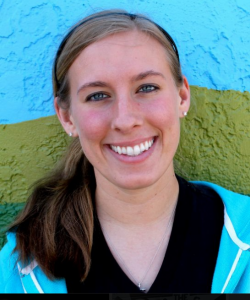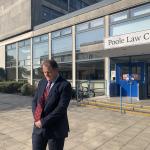 Taylor Culver is a recent graduate of Northwestern College, interning with us this summer in Chicago.
Taylor Culver is a recent graduate of Northwestern College, interning with us this summer in Chicago.
I was born and raised in Sioux City, IA and recently graduated from college with a degree in Psychology. It is here that my journey to reconciling faith and sexuality began. As a Psychology major at a Christian college, there were many questions about faith and science that needed to be answered before full reconciliation of the two fields could take place. In these courses I began to question the likelihood of the creation account actually taking place in 6 days, and then the historicity of Adam and Eve, and so on and so forth. My literalist view of Christianity was crumbling; I was terrified, but intrigued none the less.
As I began reconciling science with religion, I also began examining other beliefs I had about the world. One evening I attended a discussion on Homosexuality and Christianity. This was the first time I heard that reconciliation between Christian identity and sexual identity was possible. So many things about my world view were being challenged and I loved it. For so long I was afraid to touch things and to think about things that were seen as possible “slippery slopes” in the Christian world. But attending college and studying abroad in Romania have helped me to experience and encounter concepts, ideas and people that I had kept at a distance before.
I am grateful for the ways in which these experiences have helped me to develop insights into my faith journey and step into greater levels of authenticity. In seeking to be open minded and allowing myself to discover and befriend God through individuals on the margins, I have begun to realize that a type of righteousness can be cultivated through these friendships. I began to see the dignity and the equality of all human beings by listening to their stories, and recognizing that mine was not the only one that was valid or correct. In these relationships, along with my academic experiences, I began to lose my firm grasp on “absolute truth.” I began to live into the quote, “Cling lightly to truth and tightly to Jesus.”
This phrase was first introduced to me by a Professor at Northwestern College. My first thoughts were scattered and irresolute. Are truth and Jesus not synonymous? As I discussed this quote with some of my dear friends, we concluded that truth in this context is merely our limited understanding of the world through our own lens of our own experiences and environment. The truth we know is not the truth everyone clings to. (I know…. How postmodern right?)
Despite the discussion concerning whether this era of relativity is helpful or harmful to religious beliefs and society, by defining truth in this way we are able to “validate and dignify and legitimatize every person’s story, journey, perspective, and experience because everyone’s story is, in fact, legitimate (Andrew Marin).” If we begin our discovery of truth about the world, by operating off of this premise (that truth, to some extent, is based on each persons perspective), then I believe it extends grace to those who disagree with us and fosters humility within ourselves to listen and learn from the so called “other.”
The spring semester’s chapel theme at Northwestern College (Iowa) was righteousness. The definition that I acquired from the many speakers was that righteousness is not something that we should always strive for individually, but more often we should strive for it collaboratively. We are the body of Christ and therefore, we should be committed to bringing about the Kingdom of God to earth; the Kingdom full of peace, love, grace and commitment to other’s lives. Righteousness comes when two opposing sides meet, when privileged and marginalized, rich and poor, gay and straight, black and white, work together and become friends, mutually helping and encouraging the other. When we are able to desire friendship with a person solely based on the other person’s identity as a human being, that is when righteousness finally begins to exist.
Chris Heuertz in his book, Friendships at the Margins describes righteousness in this way:
Often when we think of righteousness, we associate it with an individual’s behavior and his or her avoidance of worldly temptations. Instead, being righteous is by definition being concerned with what is “right.” It is also standing to name and combat the power dynamics that keep things from being right. We need to establish relationships that affirm each person’s dignity and identity and when we come into those relationships, confident that God is already at work in the other person, there is no moral obligation to remind them of their sin or save them for the cause of Christ.
So perhaps we could consider letting go of the tight grip we have around our “absolute truth”. Perhaps we could transfer the passion and commitment we have towards knowing and clinging to absolute truth, to following an example Jesus laid before us. He almost always rejects answering yes or no questions, and instead answers with a parable, a slightly ambiguous answer or even another question. Maybe Jesus is suggesting that having black and white answers is not the most important thing about being a Christian, a believer, a follower.
Jesus commits to knowing and listening to the stories of those whom “religious people” would not touch. If all human beings are created in the image and likeness of God, then is it not in humanity where we should look intently to find God? Maybe truth lies in the compilation of all human life and experience. I’m not suggesting that the Bible isn’t truth. After all, the Bible is a compilation of written human experiences of God, and human beings are still experiencing God. Maybe the truth is continuing to be presented to us through the knowledge of the human experience, especially through the lives of those who have for so long been silenced and our willingness to listen to them.
Much love.















